Crows, often associated with mystery and intelligence, are highly intelligent birds known for their distinctive appearance and cawing sounds. These black-feathered creatures have sparked curiosity and debate about their potential danger to humans, dogs, and cats.
While crows are generally not considered dangerous, it is essential to examine their behaviour and interactions with other species to gain a better understanding of any potential risks involved.
In this article, we will explore are crows dangerous to humans, dogs, and cats. and cats and shed light on the nature of their interactions.
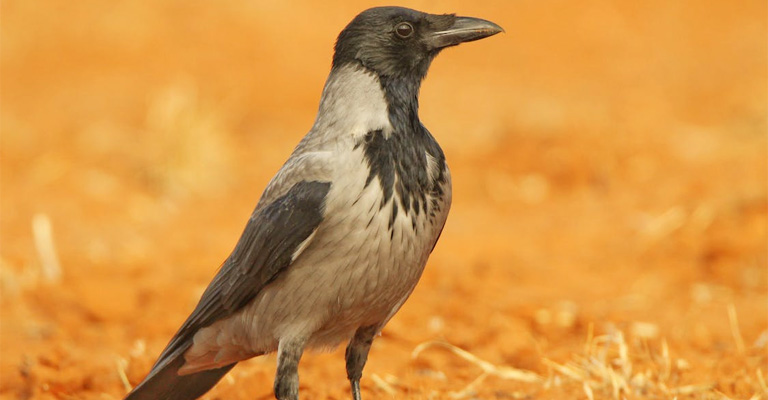
Are Crows Dangerous To Humans, Dogs, and Cats?
While crows are generally not dangerous to humans, dogs, or cats, it is important to approach their interactions with caution and respect. Understanding their behaviors and maintaining a safe distance can foster peaceful coexistence between these intelligent birds and other species.
Are Crows Dangerous to Humans?
Non-confrontational Behavior
Crows are known for their non-confrontational behaviour towards humans. They are intelligent birds that have adapted to urban and rural environments, often coexisting peacefully with humans.
When encountering humans, crows typically maintain a safe distance and observe from a perch or fly away, showing no signs of aggression.
Avoidance of Direct Confrontation
Crows have a natural instinct to avoid direct confrontation with humans. They perceive humans as potential threats and prefer to retreat or fly away when approached. This behaviour helps minimize any potential harm or conflict between crows and humans.
Rare Instances of Harm
Instances of crows causing harm to humans are incredibly rare. While crows possess sharp beaks and claws, they generally use these features for foraging, communication, and building nests rather than as weapons against humans.
Any aggressive behaviour towards humans is typically a last resort when crows feel directly threatened or perceive a risk to their safety or nesting areas.
Provocation and Nest Protection
In certain situations, crows may display defensive behaviour if they feel their nests or offspring are in danger. This can include dive-bombing or vocalizing loudly to ward off potential threats.
However, these behaviours are intended to deter rather than harm humans and are usually temporary until the perceived threat is removed.
Caution and Respect
While crows are generally not dangerous to humans, it is important to approach them with caution and respect.
Avoiding actions that may be perceived as threatening, such as getting too close to nests or attempting to handle them, can help maintain a peaceful coexistence between humans and crows.
Are Crows Dangerous To Dogs?
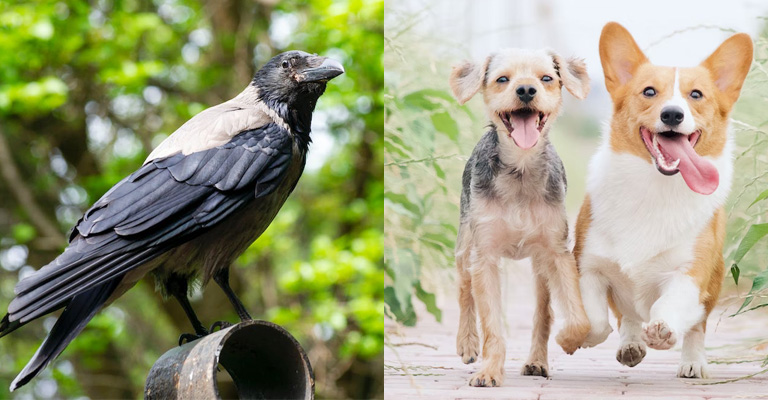
Fascination and Chase Behavior
Crows may pique the curiosity of dogs due to their unique appearance and behaviours. Some dogs may exhibit an instinctual drive to chase birds, including crows. However, this fascination does not necessarily indicate that crows are dangerous to dogs.
Agility and Flight
Crows are highly agile flyers, capable of quickly evading dogs during a chase. Their ability to manoeuvre through the air allows them to avoid physical contact with dogs and escape to safety.
Defensive Behavior
In certain situations, crows may exhibit defensive behaviour towards dogs. If a crow feels threatened by a dog’s presence, it may swoop down and dive-bomb as a defensive measure to protect itself or its nesting area. However, these defensive actions are typically intended to deter the dog rather than cause physical harm.
Supervision and Training
It is crucial for dog owners to supervise interactions between dogs and crows to ensure the safety of both animals. Training dogs to discourage chasing behaviour and maintaining control over their actions can help minimize potential conflicts.
Are Crows Dangerous to Cats?
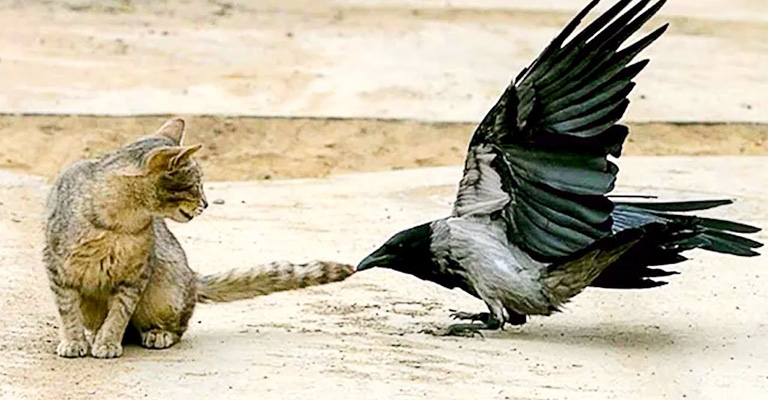
Predatory Nature
Cats are natural predators, and their hunting instincts may lead them to pursue birds, including crows. However, this does not necessarily mean that crows are inherently dangerous to cats.
Flight and Evasion
Crows are highly agile flyers and can easily outmanoeuvre cats. Their ability to take flight quickly allows them to escape potential encounters with cats, minimizing the risk of physical harm.
Defensive Behavior
In some cases, crows may exhibit defensive behaviour towards cats. If a crow perceives a cat as a threat to itself or its nest, it may engage in defensive actions such as vocalizing loudly or dive-bombing. However, these defensive behaviours are typically aimed at deterring the cat rather than causing direct harm.
Supervision and Environmental Management
It is important for cat owners to supervise their cats’ outdoor activities, especially when it comes to interactions with birds.
By closely monitoring their cats and providing suitable environments that deter hunting behaviour, such as keeping cats indoors or within enclosed outdoor spaces, the risk of potential conflicts between cats and crows can be minimized.
What Animals Do Crows Attack?
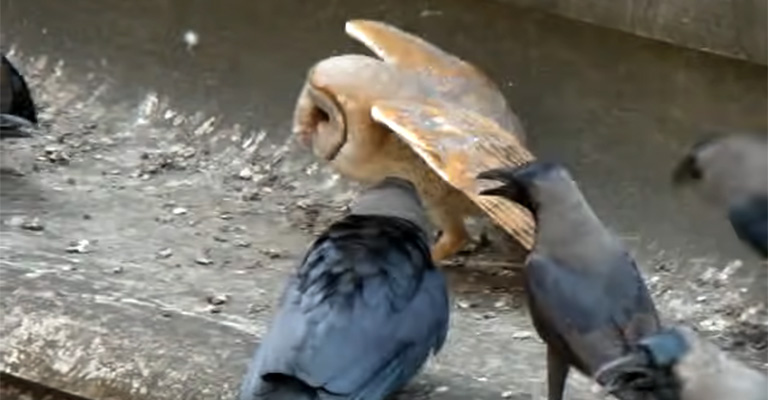
Let’s see what animal crows attack-
Other Birds
Crows are known to behave aggressively towards other bird species, particularly during the breeding season. They may attack and harass smaller birds that venture into their territory or potentially threaten their nests or young. Crows often target species such as smaller songbirds, pigeons, or even larger birds like owls or hawks.
Nest Predators
Crows protect their nests and defend them vigorously against potential predators. They may attack animals threatening their eggs or chicks, including squirrels, raccoons, snakes, or even larger predatory birds.
Crows use their sharp beaks and claws to fend off intruders and protect their offspring.
Scavengers:
Crows are opportunistic scavengers and will compete with other animals for food sources. They may engage in aggressive behaviour towards animals that encroach upon their feeding territories or attempt to steal their food. This can include confrontations with seagulls, vultures, or other scavenging birds.
Threats to Offspring
Crows are fiercely protective of their young and will take action against any animal they perceive as a threat. This can include attacking cats, dogs, or even humans too close to their nesting sites. Crows swoop, dive-bomb, or vocalize loudly to ward off potential threats and defend their offspring.
Larger Predators
Although relatively uncommon, crows may occasionally target larger predatory birds, such as owls or hawks, if they feel threatened or if there is a resource competition. Crows will engage in mobbing, gathering in groups and harassing the larger predators to drive them away from their territory.
It is important to note that while crows may display aggression towards these animals, their attacks are primarily driven by territorial defence, protection of their nests or young, or competition for resources. The behaviour of crows can vary depending on their individual experiences and environmental conditions.
How Do Crows Protect Themselves?
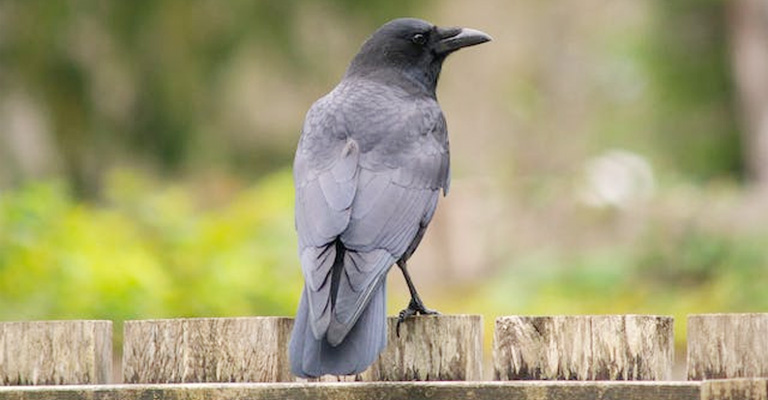
Here are some points on how crows protect themselves-
Flight
Crows utilize excellent flight capabilities as their primary defence mechanism. When they perceive a threat or feel in danger, crows take to the air and quickly fly away, using their agility and speed to escape potential predators or other sources of harm.
Flight allows them to access areas that may be inaccessible to their adversaries, ensuring their safety.
Vocalization
Crows are highly vocal birds and use their distinct cawing sounds to communicate and protect themselves. When they sense danger or intruders, crows emit loud and raucous calls for multiple purposes.
These vocalizations alert other crows in the vicinity of potential threats and act as a deterrent to intimidate predators and potential threats.
Mobbing Behavior
Crows are known for their mobbing behaviour, especially when defending their nests or young. Crows will gather in groups and aggressively confront the intruder if they perceive a threat.
They will dive-bomb, swoop, and harass the perceived threat, often targeting larger predators such as owls or hawks.
This collective defence strategy can overwhelm and intimidate the intruder, protecting the crows and their offspring.
Nest Defense
Crows are highly protective of their nests and actively defend them. They will fiercely protect their eggs and chicks against potential predators.
When a crow’s nest is threatened, the adult crows may aggressively attack the intruder using their beaks and claws to deter and drive away the threat.
Intelligence and Adaptability
Crows are brilliant birds, and their cognitive abilities play a role in their self-protection. They learn from past experiences and quickly adapt to new situations, allowing them to avoid potential threats or find alternative strategies to stay safe.
Their ability to problem-solve and use their environment enables crows to protect themselves effectively.
6 Ways To Avoid Being Attacked By Crows?
Here are 6 ways to avoid being attacked by crows-
Maintain Distance
One of the best ways to avoid being attacked by crows is to maintain a respectful distance. Crows are less likely to perceive you as a threat if you give them space. Avoid getting too close to their nests or engaging in behaviours that may be seen as provocative, such as waving your arms or making sudden movements near them.
Wear Protective Headgear
If you find yourself in an area where crows are known to be aggressive, consider wearing a hat or umbrella. Crows may be less likely to swoop down or dive-bomb if they cannot directly contact your head. This can provide an extra layer of protection and help deter potential attacks.
Modify Your Route
If you frequently encounter aggressive crows in a specific area, modifying your route or avoiding the area might be beneficial.
Crows are highly territorial and more likely to defend their nests or young if they perceive a constant threat. Adjusting your route can reduce the likelihood of confrontations.
Avoid Eye Contact
Crows are intelligent birds who perceive eye contact as a sign of aggression or a direct challenge. Avoid making direct eye contact with crows to minimize the chance of being targeted. Instead, maintain a relaxed posture and keep your gaze directed elsewhere as you pass them.
Use Deterrents
Utilizing visual or auditory deterrents can help discourage crows from approaching you. Bright, reflective objects or wind chimes can create distractions and make crows uncomfortable.
Additionally, playing recordings of predator calls or distress signals can discourage crows from getting too close.
Seek Assistance
If you consistently face aggressive crow behaviour that poses a safety concern, seeking assistance from local wildlife or bird experts may be helpful.
They can guide how to address the situation effectively, implement additional deterrent measures, or provide advice specific to your location.
Remember, while crows may exhibit defensive behaviour or occasional aggression, such instances are rare and can often be prevented by respecting their space and avoiding behaviours perceived as threatening.
By taking these proactive steps, you can minimize the chances of being attacked by crows and coexist peacefully with these intelligent and fascinating birds.
FAQs
Crows are generally not considered dangerous to humans. They tend to avoid confrontations and fly away or maintain a safe distance when approaching. Instances of crows causing harm to humans are extremely rare and usually occur when the bird feels directly threatened or cornered.
Crows are not typically dangerous to dogs. While some dogs may find crows fascinating and try to chase them, they are agile flyers and can easily evade dogs.
In rare instances where a crow feels threatened, it may engage in defensive behaviours like swooping or dive-bombing, but it is more of a scare tactic than a genuine threat.
Crows are generally not considered dangerous to cats. While cats may have a natural hunting instinct towards birds, including crows, the birds’ flight abilities and defensive behaviour often prevent physical contact.
Crows may exhibit defensive behaviour to protect their nests or young ones, but attacks on cats are uncommon.
While crows are not typically harmful, there are rare instances where they may cause harm if they feel directly threatened or if their nests or offspring are in danger. These instances, however, are infrequent and can often be avoided by respecting their space and not provoking them.
To peacefully coexist with crows, it is important to give them space and avoid actions that may be perceived as threatening, such as getting too close to their nests.
Appreciate their presence and intelligence from a respectful distance. Providing suitable environments for them to forage and nest can also promote a harmonious coexistence.
Conclusion
Despite their sometimes intimidating presence, crows are not inherently dangerous to humans, dogs, or cats. While they may display territorial behaviour during certain seasons, their aggression is primarily directed towards other birds, especially during nesting periods.
Crows’ intelligence and adaptability have allowed them to coexist with humans and even exhibit cooperative behaviour in certain instances. However, it is essential to remember that individual crows may behave differently based on their experiences and surroundings.
Like any wild animal, it is advisable to exercise caution and avoid provoking or disturbing crows, especially if they have established nests nearby.